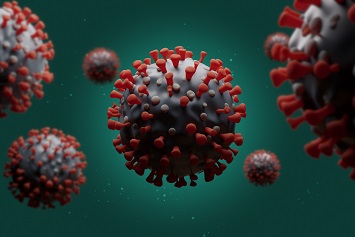Thirteen medical and scientific experts urged the Biden administration to take immediate actions to address SARS-CoV-2 inhalation hazards, including issuing an emergency Occupational Safety and Health Administration (OSHA) standard. The SARS-CoV-2 virus causes COVID-19, which was declared a pandemic in March 2020.
Signers of the letter to the White House, Centers for Disease Control and Prevention (CDC), and National Institutes of Health (NIH) officials included David Michaels, former OSHA administrator under President Barack Obama.
The letter’s signers contend that current CDC and OSHA guidance does not adequately address the risk of transmission through inhalation of small airborne particles. Much of the federal guidance still refers to exposure to “respiratory droplets.”
A failure to address inhalation exposure to SARS-CoV-2 puts workers and the public at serious risk of infection, according to the letter. The letter urged the CDC and OSHA to recommend and require the use of respiratory protection, such as N95 filtering facepiece respirators (FFRs), to protect all workers at very high risk of exposure and infection, including all healthcare workers and workers in correctional facilities and food processing.
The letter from Michaels; Peg Seminario, former director of occupational safety and health for the American Federation of Labor and Congress of Industrial Organizations (AFL-CIO); Linsey Marr, professor of civil and environmental engineering at Virginia Polytechnic Institute and State University (Virginia Tech); and 10 others called on the administration to:
- Issue an OSHA emergency standard on COVID-19 that recognizes the importance of aerosol inhalation and includes requirements for exposure risk assessments and control measures following a hierarchy of controls, as well as addressing requirements for effective respiratory protection for healthcare and other workers at high risk of exposure to COVID-19.
- Update and strengthen CDC guidelines to fully address transmission via inhalation exposure to small inhalable particles from infectious sources at close, mid-, and longer range.
- Use the Defense Production Act to ramp up production of N95 FFRs, elastomeric respirators, powered air purifying respirators (PAPRs), and high-quality barrier face coverings.
- Direct healthcare organizations to stop all respirator contingency measures, such as decontamination of N95 FFRs and use of nonrespirator facepieces like surgical masks in place of respiratory protection, and expand CDC recommendations for respiratory protection to include all workers in healthcare and related sectors, not just those with direct care of COVID-19 patients.
- Update CDC recommendations, and adopt standards for barrier face coverings for the public with high levels of filter efficiency.
- Coordinate a national effort to enhance and distribute the supply of National Institute for Occupational Safety and Health (NIOSH)-certified respirators and ASTM International barrier face coverings for worker protection.
Better Respiratory Protection
The group recommended providing workers at lower exposure risks with high-performing barrier face coverings certified to provide at least 80% filter efficiency. N95 FFRs have a 95% filter efficiency. A newly issued ASTM International barrier face covering specification includes labeling provisions for masks with filter efficiencies of greater than or equal to 20% and greater than or equal to 50%.
The letter pointed out that Austria, France, and Germany recently mandated respiratory protection equivalent to N95 FFRs and higher-quality masks for both workers and members of the public, as well as recommended enhanced ventilation in indoor spaces.
The letter was addressed to Jeffrey Zients, White House coordinator of the COVID-19 Pandemic Response; CDC director Rochelle P. Walensky; and Anthony S. Fauci, director of the National Institute of Allergy and Infectious Diseases at the NIH.
Michaels also was a member of President Joe Biden’s COVID-19 advisory panel during the presidential transition.
The American Industrial Hygiene Association (AIHA) Indoor Environmental Quality Committee, Respiratory Protection Committee, and COVID-19 Project Team also recently called for stronger workplace health and safety guidance to address concerns about the aerosol transmission of SARS-CoV-2. The group also recommended an emergency OSHA standard and prioritizing better respiratory protection options.

